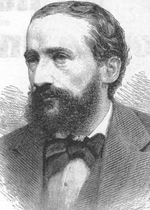Zukertort, Johannes Hermann (07.09.1842 – 20.06.1888)
 Born in the Polish city of Lublin, Zuketort studied in Breslau where he graduated with a doctorate in medicine. He was fluent in eleven languages and also a talented pianist.
Born in the Polish city of Lublin, Zuketort studied in Breslau where he graduated with a doctorate in medicine. He was fluent in eleven languages and also a talented pianist.
During his studies, he met in the local chess club the great player Adolf Andersen, who was living in the same city. He was involved as a doctor during the war 1866 against France. Once this was finished, he established himself in Berlin and started his career as a chess player and also as a chief redactor of the Neue Berliner Schachzeitung.
With some good literary success, he founded a few years later in London the magazine, The Chess Monthly.
He played twice against his Master Anderssen, lost the first match 8.5-5.5 but won the second 5-2. After a second place in Leipzig in 1877, his first major chess success came in Paris in 1878, sharing the first place with Winawer in the tournament ahead of Blackburn, Bird and Anderssen.
The same year, he became a British citizen, After winning in 1880 a first match vs Rosenthal from France (+7-2=5) and a second one against Blackburne in 1881, he was considered to be one of the strongest chess players in the world. Later in London, he finished the first with 22 points out of 26 ahead of Steinitz and Chigorin.
Strong of his popularity, he was chosen by the best player at the time, W. Steinitz, to play in the first World Championship match, which was organised in the US in 1886, and played in three cities – New York, St. Louis and New Orleans. Zuckertort started very well leading after New York with three points. However, the length of the match and the humid weather of Louisiana made him completely collapse and break down; he had to let Steinitz be crowned as the first World Champion.
Lasker said, “The one who was the greater thinker won the day from the one who had the greatest talent.” With very bad health and a heart problem, he could not ever recover psychologically from this defeat.
He died in London two years later on 20 June 1888 in a miserable financial situation. He was a specialist of blind game playing, probably more games in blind chess rather than in normal chess. His intellect and culture and behaviour were irreproachable. He was really appreciated in the chess world, being a specialist in chess theory, and there is still one opening named after him.



